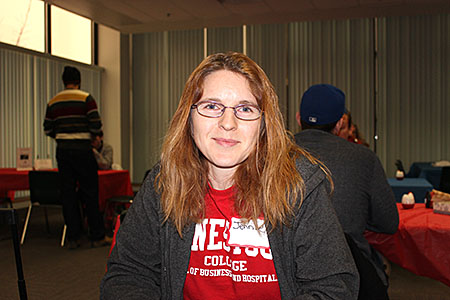BY JOSH KENNEDY
Students got the chance to listen to a person’s life story at the Human Library, which took place at the Learning Resource Centre on Jan. 29.
During this event, “human books” allowed students to come and listen to an experience in their lives that was worth talking about. These included young parents, victims of domestic abuse, those with addictions and people with learning and physical disabilities.
The Human Library is an international organization that was started by a Danish youth organization called Stop the Violence. It was created in 1993 by five young people from Copenhagen who decided to try and raise awareness and use peer group education to mobilize Danish youngsters against violence after the stabbing of a mutual friend of theirs. The organization had 30,000 members all over the country in just a few years. In 2000, Stop the Violence was encouraged to organize events that would focus on anti-violence, encourage dialogue and build relations. Thus, the Human Library was born.
Conestoga’s Student Life department came across the Human Library while researching opportunities to engage students as part of the Respect Campaign at the college.
This event is meant to challenge assumptions, identify stereotypes and celebrate diversity.
“I think students are surprised by the differences in each individual in our community and the resilience that people have throughout their life stories,” said Laura Black, Student Life programmer at Conestoga. “Participants can expect to learn a lot about each other and themselves.”
The Human Library has been running at Conestoga College since 2012, making this the fourth annual Human Library. About nine “human books” attended the event this year.
Everyone has a story to talk about and the Human Library is a great way to get that story out there.
The following are some of the participants’ stories.
Jennie Garbett, a mother of three, survived 16 years of domestic abuse at the hands of her husband. She said he was very controlling of her; she could not pick out her own clothes, books or music. She wasn’t even allowed to drive her husband’s car, even though she helped pay for it, and if he found out she was driving it, he would threaten to call the police and have her charged with theft.
“I did not know who I was,” Garbett said. “All of my hobbies were his hobbies.”
Garbett could not leave her husband because she could not support her children. Every time she earned enough money to leave, her husband would find it and spend it.
When she finally left, Garbett said it was the most amazing thing ever. Only then did she discover that she loved to learn and has made it a full-time hobby. She is currently a student at Conestoga College, studying office administration.
Josiah Chalmers is a gay male who was diagnosed with disorganized schizophrenia three years ago and has just recently developed dissociative schizophrenia as well.
Chalmers’ first schizophrenic hallucination occurred three years ago when he was raped, but he hasn’t let it get him down.
“The past has made me a stronger person,” Chalmers said. “It helped me talk about my problems instead of hiding them.”
In October, Chalmers came out to his parents, who have accepted it.
He is currently studying marketing and advertising at Conestoga and recently got engaged to his boyfriend. He also has a dream to one day open up his own café.
To other people in his situation, Chalmers advises, “Be true to yourself and don’t give up.”
Sandy Lozano was a victim of a robbery that occurred at a shopping centre she used to work at. Afterwards, she suffered from post-traumatic stress disorder. The most difficult part of the healing process was the lack of understanding from her employer about the short term and long term effects of the traumatic experience.
Lozano is currently in the bachelor of community and criminal justice program at Conestoga and is volunteering as a crisis responder at Victim Services of Waterloo Region.
She advises others who know someone who has experienced what she went through to take the time to talk to these victims about it because victimization often is not discussed and victims often do not have a voice in sharing their experience.
“I recommend people to be very open-minded and try to be supportive,” Lozano said. “Victims tend to bottle up their emotions and they need to feel safe to talk about it.”

